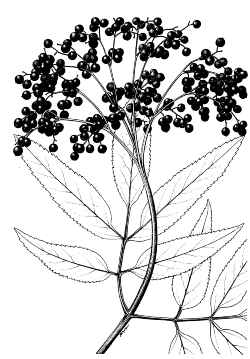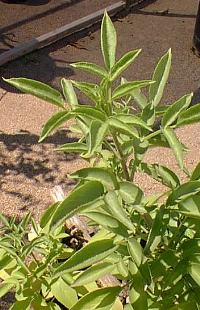American Elderberry, Sweet Elderberry
Scientific Name: Sambucus nigra ssp. canadensis (L.) R. Bolli
Synonym: Sambucus canadensis, Sambucus cerulea var. mexicana , Sambucus mexicana, Sambucus orbiculata, Sambucus simpsonii
Family: Caprifoliaceae
Sunset®: All zones
USDA: 3-11
Sun Exposure: Full sun to light shade
Origin: Eastern North America from Nova Scotia to northern Mexico
Growth Habits: Deciduous to semi-evergreen shrub, up to 15 feet tall (4.5 m); pinnately compound leaves, 3 to 7 serrate leaflets, 2 to 6 inches long (5-15 cm)
Flowers: White or light yellow flowers
Watering Needs: Regular to little water when established
Propagation: Offset, seeds, cuttings

Sambucus mexicana, U.S.D.A. Forest Service, courtesy of the Hunt Institute
Blooming Habits:
Small white flowers, in flat top clusters, up to 10 inches in diameter (25 cm), in early summer.
Fruiting Habits:
The elderberry has purplish-black berries, 0.12 to 0.25 inch in diameter (3-6 mm). The fruits of the elderberry are very attractive to birds. They are also edible and can be used to make jelly or wine. Tea made with the dried flowers is supposed to be good for the cough.
Propagation:
Cuttings are easy. Seeds need stratification.
Desert-Tropicals is dedicated to provide gardening advice, gardening ideas, and information about flower of all kind for landscape and collections.We try to check carefully the identification of the plants on the illustrations as well as the other information from the page, but occasionally errors do occur. if you notice anything that needs to be changed please contact us.Thanks.
© 1998-2020 Philippe Faucon, All Rights Reserved.
